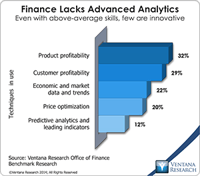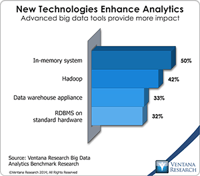Managing prices has always been an activity of keen interest to businesses, but it has become even more critical to do it well. Over the past decade many companies have found their ability to raise prices has been constrained by intense competition resulting from Internet commerce, global competition and other factors. One tool for dealing with this pressure is price and revenue optimization (PRO), an analytic methodology that calculates how demand varies at different price levels and then uses...
Read More
Topics:
Big Data,
Performance Management,
Sales,
Office of Finance,
Operational Performance Management (OPM),
Analytics,
Business Analytics,
Business Performance Management (BPM),
Financial Performance Management (FPM),
Sales Performance Management (SPM),
analytical application,
Price Optimization
Our benchmark research into business technology innovation shows that analytics ranks first or second as a business technology innovation priority in 59 percent of organizations. Businesses are moving budgets and responsibilities for analytics closer to the sales operations, often in the form of so-called shadow IT organizations that report into decentralized and autonomous business units rather than a central IT organization. New technologies such as in-memory systems (50%), Hadoop (42%) and...
Read More
Topics:
Big Data,
Operational Performance,
Analytics,
Business Analytics,
Business Collaboration,
Business Intelligence,
Business Performance,
Cloud Computing,
Customer & Contact Center,
Data Preparation,
Information Applications,
Information Management,
Operational Intelligence,
analytical application,
analytics in the cloud
One trend in business software that’s still in its early stages but gathering momentum is the availability of modeling tools that fill the gap between desktop spreadsheets and enterprise systems. Granted this “early stage” has been under way for quite some time, but the technology has finally progressed to the point where I expect it to get increasing market traction.
Read More
Topics:
Big Data,
Database,
Planning,
Sales Performance,
Forecast,
Office of Finance,
Essbase,
Quantrix,
Operational Performance,
Analytics,
Business Analytics,
Business Collaboration,
Business Intelligence,
Business Performance,
Financial Performance,
In-memory,
Workforce Performance,
finance,
analysis,
analytical application,
business model,
business plan,
financial model











